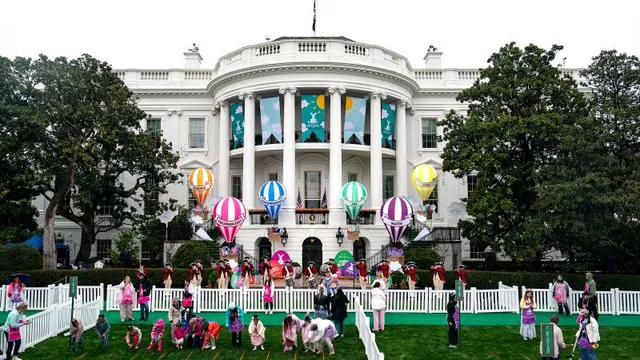
Trump hosts 40,000 at Easter Egg Roll amid corporate sponsorship controversy
2025-04-21 14:15- The Easter Egg Roll is a historic event dating back to 1878, celebrating Easter with activities promoting family and fun.
- This year's event was notable for a significant increase in corporate sponsorship from major tech companies, raising moral questions.
- The blend of corporate interest and a cherished American tradition casts a new light on the future of family-oriented public events.
Express your sentiment!
Insights
On April 21, 2025, the United States witnessed a cherished tradition as President Donald Trump and First Lady Melania Trump held the White House Easter Egg Roll, expecting 40,000 attendees. The event, which has deep historical roots dating back to 1878, included various festive activities such as rolling dyed hard-boiled eggs, an egg hunt, and stations promoting the upcoming 250th anniversary of America's founding. While the event is known for its family-friendly atmosphere, this year's roll was marked by significant corporate sponsorship involvement, raising questions about the implications of commercial interests in public events. Leading up to the event, the White House partnered with major tech firms including YouTube, Amazon, and Meta, soliciting contributions ranging from $75,000 to $200,000. The move was characterized by critics as an unconventional shift away from previous traditions where funding primarily came from the American Egg Board and other familiar sponsors. This year, Harbinger, an outside production company hired by the White House, played a vital role in soliciting these sponsors. Attendees were promised various opportunities for engagement, with the highest-paying sponsors receiving perks such as naming rights for key event areas and custom-branded items. The marketing of the Easter Egg Roll demonstrates an evolving relationship between corporate entities and government, complicating once-clear lines surrounding the use of public office for private gain. Critics observed that this approach diminishes the historical significance and cultural integrity of the tradition, indicating that the day’s celebratory aspects might be overshadowed by corporate branding. Despite the cloud of corporate influence, the day focused on the children and families participating in the events planned for Easter Sunday. With the scattered rain forecast, there remained concerns regarding the weather's impact on attendance and activities, but organizers remained optimistic about the day's success. Celebratory performances and childhood activities carried on, ensuring that the essence of family tradition, despite a shift toward commercialization, still held relevance in the joyful occasion of the Easter Egg Roll.
Contexts
Corporate sponsorships play an increasingly significant role in financing government events, ranging from large-scale public gatherings to specialized conferences. This trend reflects a growing recognition among public institutions of the potential benefits that come through partnership with the private sector. These can include the provision of funds, resources, and expertise, enabling governments to offset costs, enhance the quality of their events, and ultimately foster public engagement. However, while corporate sponsorships can catalyze numerous advantages, they also come with inherent challenges that must be carefully considered to ensure the integrity and impartiality of governmental functions. One major advantage of corporate sponsorship is financial support, which allows government entities to allocate resources more effectively. By securing sponsorship, organizers can mitigate expenses associated with venue rental, logistics, promotion, and materials, thereby reallocating funds to other community projects or services. Furthermore, corporate partners often bring valuable experience and technological resources that improve event execution and enhance participant experiences. This collaboration can lead to more innovative programming and greater outreach, allowing events to attract larger audiences and foster community involvement. Despite these advantages, corporate sponsorships also raise crucial concerns around potential conflicts of interest and the influence of corporate agendas on public discourse. Critics argue that the dependence on corporate funding may lead to perceptions of bias, where events become platforms for corporations to promote their brand or interests rather than serving the public good. It is essential for governmental organizations to prioritize transparency in sponsorship agreements and to establish guidelines that dictate the nature of corporate involvement. By maintaining a clear separation between commercial interests and public governance, transparency can help ensure that the integrity of the event and the interests of the public are preserved. To mitigate risks and maximize benefits, governments should consider implementing strategic frameworks for corporate sponsorships. Establishing clear criteria for choosing sponsors, as well as transparent reporting processes, can help build trust and accountability. Additionally, engaging in direct dialogue with the community to gather feedback about sponsorship deals will strengthen the democratic process, ensuring that public events remain aligned with community interests. Overall, while the impact of corporate sponsorships in government events can produce both positive outcomes and potential pitfalls, a careful approach to management and collaboration can drive significant benefits for public agencies and the communities they serve.